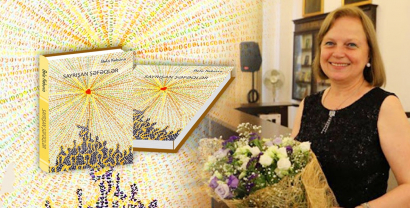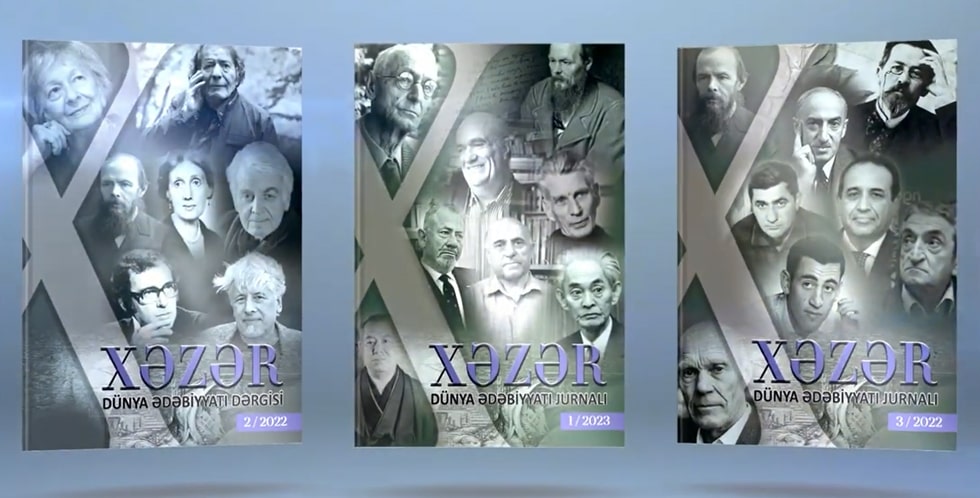Georgian Poetry Published in Azerbaijani

The Azerbaijan State Translation Centre (AzSTC) is pleased to announce the publication of Twinkle of the Lights, a new collection of poems (in Azerbaijani translation) by Bela Keburia, a notable poet from Georgia. He was awarded the Tsarina Tamar Prize for Literature.
What do Drops Say, God, My Guess, Will Begin are among the 110 poems included in the book.
The translator and author of the foreword to the book is Imir Mammadli. The editor is Mahir Garayev.
What do Drops Say
Imir Mammadli
Contemporary poetry, from the point of view of the inner impulse, can roughly be divided into two trends, one of which is poetry based on rational knowledge, and the other on intuitive knowledge.
Before explaining their essence, these questions demand to be answered: What is knowledge? What kind of memory of thinking is supposed to be related to poetic thinking? André Gide, a great French writer and winner of the Nobel Prize in Literature, says that the notion we have called knowledge up to day is not knowledge; it is simply information – the information about this or that phenomenon or event.
Knowledge is layers that open in the human mind and spirit lifelong. The depth of knowledge can be measured by the number of these layers.
These layers can be only discovered by the process of self-reflection and deep life practice through philosophical thinking. Now let's go back to the main point of our conversation.
A poem based on rational knowledge describes its subject and emotions that the author experiences within it, trying to influence the reader's pleasure through artistic expressions and metaphors. In this case, preference is given not to the sound of the heart, but to the word of conscious and mind. From this point of view, Azerbaijani poetry can be considered an example of rational poetry, from epic epoch to purely lyrical.
In poetry based on intuitive knowledge, the situation is opposite to it. The author here refers not to the object described, but to the event, which, in its entirety, perfectly reflects the internal and external existence of the object. In other words, the author sees the events in her "mind's eye," or "heart's eye," prefers visuality that is similar to X-rays. Such poetic examples can be found in Japanese, Chinese, modern European or modern Turkish poetry.
Bela Keburia is one of the brightest representatives of the poetic trend based on rational knowledge. In other words, she is a faithful follower of the traditional Georgian poetry. Perhaps, the readers realized that the traditional Georgian poetry like Azerbaijani poetry is a poetic treasure based on rational knowledge.
Bela Keburia came to literature in the 1980s. At that time, at the 60s, a new rhetoric style and form of searching in Georgian poetry gained a wide scope. This tendency was attractive for young generation. However, Bela Keburia preferred the traditional Georgian poetry; she rooted her creativity on it and until the end remained faithful to her choice.
Apparently, the rules of a person's life come out of his/her nature that settled down in his/her subconscious. For Bela Keburia commitment to traditions is not limited to her attitude to words. She is committed to all Georgian traditions, including family traditions that have deep roots. Here I would like to give an explanation. Once we were talking about something. Suddenly Bela stared somewhere far away and said, more concretely she whispered a word that was irrelevant to the conversation at that moment. “There's only one thing I want from God: To put my head on Teymur’s chest (Teymur was Bela Keburia’s husband), let me feel his breath and let this breeze pass through my face forever.” They have their own not such a big house in rainy Batumi, and that breeze always blows in that house...
Batumi is not such a big city. But it's not so small for everyone to know one another. But everyone knows Bela Keburia in this port city. If you want to have a walk with her in the city, a 15-minute walk will take more than an hour. Because at every step this beautiful lady comes across cheerful friends, they greet each other and ask about each other’s health; they express how much they love her as a representative of creative world. Fortunately, while walking you can’t stop too long, as it is often rainy in the city:
Naira Gelashvili, a prominent Georgian writer, once said: “It seems to me that God loves those who seek him more than those who say I have found Him.'
For Bela Keburia, the theme of “the creator and the created” is not unfamiliar, but perhaps it would be more correct to say that this theme is the central theme in her poems.
A wise man said: “Although Jesus Christ was born a hundred times in Bethlehem, if he is not born once in your heart, it will be worthless. He was born in Bela Keburia’s heart long ago, and he is always helpful in seeking the light of God.
In the conclusion, I wish to state: as for all Georgians, the homeland is dear for Bela Keburia as well, and the following poem is an example of her love for Georgia:
I see ...
I know...
Here it's ...
You are here...
Your tears are on my face,
Yes, your breath is my breath
I am your child, you are my mother, my motherland!
AND OTHER...
-
 Book “Fuzuli’s Creativity” by Mir Jalal Out in Jordan
Book “Fuzuli’s Creativity” by Mir Jalal Out in Jordan
The book “Fuzuli’s Creativity” by the famous Azerbaijani writer and literary scholar Mir Jalal, which tells about the works of the brilliant Azerbaijani poet...
-
 Yusif Vazir Chamanzaminli’s Creativity in the Israeli Literary Magazine
Yusif Vazir Chamanzaminli’s Creativity in the Israeli Literary Magazine
“Artikl”, the popular Israeli literary magazine, has posted in Russian an excerpt from the novel “In the Crossfire” by Yusif Vazir Chamanzaminli, the outstanding...









